Organics collection (green lid)
Kitchen to Compost
The green bin is for all your organics. Both food and garden organics combined. The service is carried out weekly on the same day as your rubbish and recycling service and is available for residential houses and apartments.
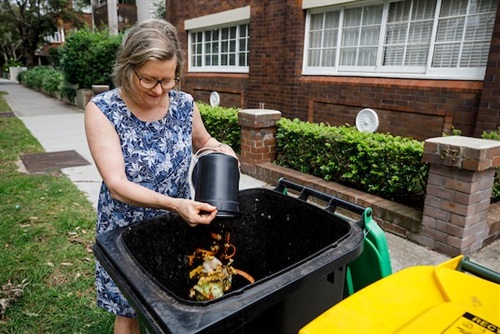
To find your organics collection day, search for your property in our Organics Collection Day map.
Did you know you can put food scraps into your green lid bin?
You can reduce the amount of waste going to landfill and create compost instead, simply by placing your food scraps into your green-lid bin instead of your red-lid garbage bin.
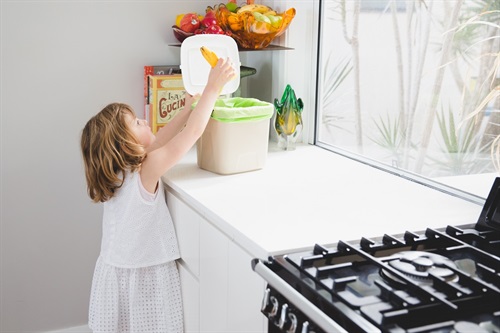
Why compost food waste?
Food scraps make up nearly half the waste our local area sends to landfill each week.
With your help, we can make sure our food scraps are composted instead of going to landfill! This will lower our greenhouse gas emissions and help return vital nutrients back to our environment through compost.
All you need to do is make one simple change and place your food scraps in your green bin, along with garden organics, for collection each week. Or you can make your own compost at home.
This is a great opportunity to take action on food waste to look after our environment.
How does it work?
It's easy:
- Use a small kitchen bin or caddy (we recommend one with a lid) to collect food scraps separately from your general garbage. You can wrap scraps (see list below) in newspaper, use a compostable bag* or just put them loosely into the bin.
- Transfer food scraps from your kitchen bin to your green bin outside as required. If your scraps are wrapped in newspaper or a compostable bag* these are ok to go in too.
- Place your green bin out for collection the evening before your scheduled service day. Green bins are serviced every week.
*Compostable bags must display AS 4736 Australian certification and display the seedling logo. These are the only type of certified bags we can accept. Never use plastic, or other forms of biodegradable bags as they contaminate the composting process and undo all your good work.
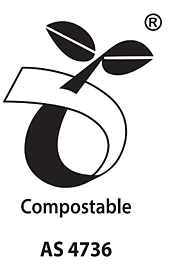
What can go in my green bin?
In addition to garden organics like grass clippings, leaves and branches you can place any type of food scrap, left over, spoilt or out of date food into your green bin. This can include:
- Fruit and vegetable peels and scraps
- Meat and seafood scraps and bones
- Egg shells and cheese
- Bread, pasta, rice and cereal
- Loose leaf tea and coffee grounds
- Out of date food (processed or fresh)
- Take away food
- Pantry food and left overs
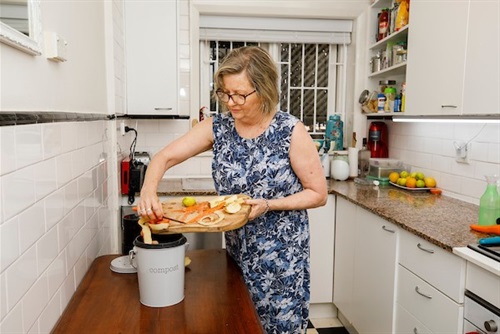
When filling your green-lid bin:
- DO NOT overfill, make sure the lid is closed to avoid spillages and pests
- Garden materials must be cut into pieces that fit inside your bin
- Consider layering the bottom of your green bin with newspaper or leaves/twigs to absorb liquids from food scraps
What can't go in my green bin
- Tea bags and coffee pods
Some tea bags contain PFA chemicals (a special coating to resist water breaking them apart) and some are made from plastic/mesh. As a result tea bags are not recyclable. However, loose tea leaves can go in your green bin. Residents can put tea bags in their home compost or worm farm if they have one.
- Plastic bags/plastic liners
- Pet waste/kitty litter
- Tissues/baby wipes
- Compostable nappies/packaging/coffee cups
- Cardboard packaging/pizza boxes
- Tree stumps or branches thicker than 150mm
- Fence palings, timber and building materials
- Sawdust, soil and rocks
- Other garden items like hoses, plastic plant pots, garden tools
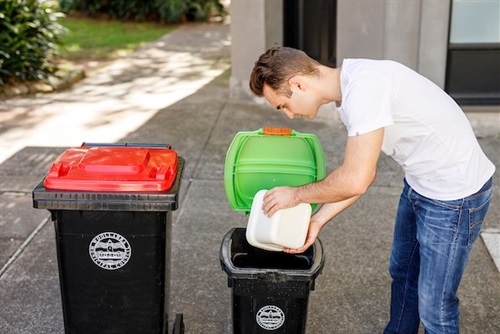
Can I put food scraps into compostable bags?
Yes, you can use compostable bags. They must be AS 4736 certified compostable and display the Australian certification seedling logo. These bags are made from plant products and can be broken down using commercial composting methods.
Never place food scraps in plastic bags or any other form of biodegradable bag. Newspaper can be used as an alternative to wrap scraps if preferred.
Compostable bags can be bought from online suppliers such as:
Compost-A-Pak
Cardia Bioproducts
BioPak
BioBag
Frequently Asked Questions
How often is my green bin collected?
Your green bin is serviced weekly along with your red-lid garbage and yellow-lid recycling bin. There are no changes to our service schedule. Present all your bins the evening before the designated day of service in your area.
To find your organics collection day, search for your property in our Organics Collection Day map.
What will happen if I put the wrong things in my green bin?
The wrong materials, (e.g. plastic bags, garden hose, nappies) in your green bin will contaminate the compost, therefore contaminated bins cannot be collected. Your green bin should only contain food scraps (loose, in a compostable bag or wrapped in newspaper) and/or garden organics. If in doubt, leave it out. If you require more information please phone customer service on 9391 7000
What happens if my green bin is not emptied?
As long as you follow our advice about what can or cannot be placed in your garden organics bin it should be emptied each week. However, a missed collection may result if wrong materials are found in your bin. If your bin is not contaminated or you have removed the contamination, it should be reported to Customer Service by calling 9391 7000. Missed collections will be addressed within 24 hours.
What to do if your bin is lost, damaged or stolen?
If your bin has been lost, damaged or stolen, contact us online or call Council's Customer Service Centre on 9391 7000. A Customer Services Officer can assist you in placing an order and a new bin will be delivered within 7 working days.
How to ensure your rubbish is collected
- Ensure your organic waste is presented in an official Council issued bin or it will not be collected.
- Wheel your bin to the kerb the night before service in an accessible position with the front facing the road (handles facing rear towards your house).
- Remove your bin from the kerb within 12 hours of being collected.
- Store bins on your property. Do not store bins in the street, footpath or in a back lane.
- Do not overfill your bin. Make sure the lid is closed to avoid spillage and attracting vermin.
- Do not put additional bundles or bags of garbage next to your bin. It is considered as illegal dumping, it will not be collected and could incur a fine exceeding $535.
- Do not put building materials, such as sawdust, bricks, tiles or timber, in your bin.
I live in an apartment, can I use this service?
Yes! Residents living in apartments can use the service. The more food scraps we can recycle, the better. Council can help by providing all the necessary education materials for residents, strata managers, body corporates and cleaners. By working together, we can ensure that all residents are aware of the service and understand how to use it. If your building requires additional green bins, please phone customer service on 9391 7000 to place and order. The bin/s will be delivered within 5 working days.
I live alone, or with one other person, we don't generate enough organics to fill a bin.
It doesn’t matter how much or how little you have, your bin does not have to be full for collection. Council will empty your green bin weekly as long as you place it out for collection. Keep in mind that every little bit helps. Collaboratively, your little bit, along with the rest of the community will drastically reduce organic waste to landfill and ensure it is recycled.
My garden organics get collected in a green crate, can I participate?
Green crates are only used in the Monday collection zone which includes Paddington, West Woollahra and a part of Edgecliff. Unfortunately, we cannot accept food organics in crate receptacles. If you wish to participate in the service, Council can provide a small 60L bin with a lid. Please phone Council on 9391 7000 to place an order. Alternatively, you can consider doing your bit for the environment by composting or worm farming at home which can achieve the same results in waste reduction. Go to Compost Revolution for more information.
Will my green bin get smelly and attract pests?
Your green bin is collected weekly so it shouldn’t smell or attract pests any more than your red garbage bin does now. Food scraps may also be wrapped in newspaper or compostable bags which should detract pests, minimise odour and soak up any liquids. Some other tips include:
- Store your green bin out of direct sunlight to stop it heating up.
- Freeze bones/scraps of fish, meat, and dairy until the night before collection to avoid odours and pests.
- Place some twigs in the bottom of your green wheelie bin to stop food sticking and help with aeration.
- Place bi-carbonate soda in the bottom of your kitchen and green wheelie bin to absorb liquids and odours.
- Keep some grass clippings or leaves on hand. After placing food scraps in the green bin, place some grass clippings or leaves on top which will provide cover from pests, and minimise odour.
- In the event you find fly maggots in your bin and wish to eradicate them, boiling water poured on-top is a safe and non-toxic method.
- Natural fly deterrents include citrus and eucalyptus oils. Place a few drops onto an absorbent cloth and leave in the area where flies are a problem or even attach to bin lids. You could also experiment with citrus peels.
Residents have also suggested:
- Keeping your kitchen bin in the fridge to keep tiny vinegar flies away
- If you have little or no garden organics to mix with food scraps, ask your neighbour if they wouldn’t mind parting with some of theirs OR ask your neighbour if you could put a small bundle of food scraps in with their green wheelie bin the evening before collection.
- Line the bottom of your bin with scrunched balls of newspaper to absorb liquids.
Remember, do not place plastic bags in your green bin as they interfere with the compost process.
What if I'd prefer to compost my organic waste at home?
This is great news! Home compost/worm farms can recycle your food scraps and provide you with the satisfaction of creating your own compost. If you would like to purchase a compost bin or worm farm with an 80% discount go to Compost Revolution. This Council program has successfully helped and supported residents starting their journey to reducing food waste and creating compost.
What if I don't have any garden organic waste?
We still encourage the use of your green bin for food scraps even if you have little or no garden organics. Your food scraps are the most important part as we are trying to reduce this waste to landfill. If your green bin is too big, phone Council on 9391 7000 to discuss other bin options.
It's too hard to separate my food scraps.
We all generate waste and managing it in a sustainable way is everybody’s responsibility. It’s really very easy to separate your food scraps into the green bin. Try separating small amounts at first to become familiar with how this might work for you. Soon separating food scraps will become second nature.
Think about the outcome you would prefer for your family and the environment – landfill or compost? This is an easy way and great opportunity to help protect the environment, reduce waste to landfill and reduce greenhouse emissions.
Does Council supply kitchen caddy bins and compostable bags?
At present, Council has a small supply of kitchen caddies and bags left over from our roll-out a few years ago. These are available for pick up at Council Chambers reception 536 New South Head Rd, Double Bay while stocks last. Please phone ahead to ensure the items are available on 9391 7000.
To find your organics collection day, search for your property in our Organics Collection Day map.